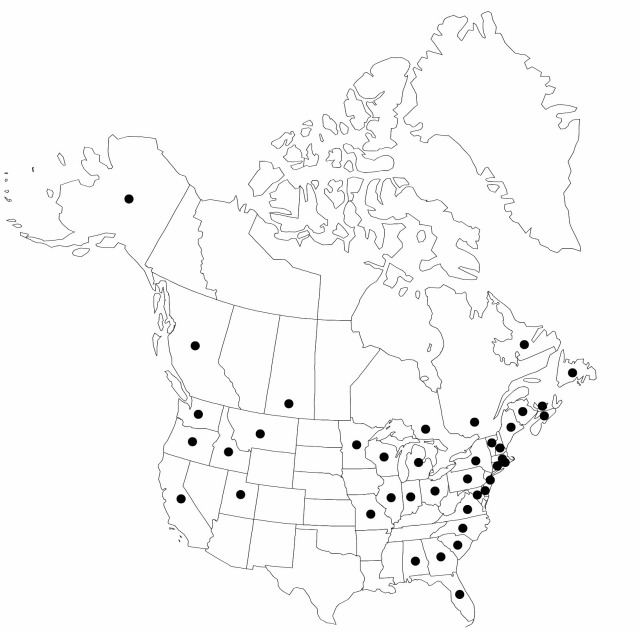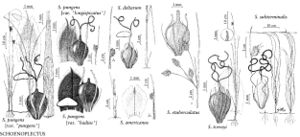Difference between revisions of "Schoenoplectus subterminalis"
Cas. Nár. Mus., Odd. Prír. 140: 127. 1972.
FNA>Volume Importer |
imported>Volume Importer |
||
| (3 intermediate revisions by 2 users not shown) | |||
| Line 8: | Line 8: | ||
}} | }} | ||
|common_names=Water bulrush;water club-rush;swaying bulrush;scirpe subterminal | |common_names=Water bulrush;water club-rush;swaying bulrush;scirpe subterminal | ||
| + | |special_status={{Treatment/ID/Special_status | ||
| + | |code=F | ||
| + | |label=Illustrated | ||
| + | }}{{Treatment/ID/Special_status | ||
| + | |code=E | ||
| + | |label=Endemic | ||
| + | }} | ||
|basionyms={{Treatment/ID/Basionym | |basionyms={{Treatment/ID/Basionym | ||
|name=Scirpus subterminalis | |name=Scirpus subterminalis | ||
|authority=Torrey | |authority=Torrey | ||
| + | |rank=species | ||
|publication_title=Fl. N. Middle United States | |publication_title=Fl. N. Middle United States | ||
|publication_place=1: 47. 1824 | |publication_place=1: 47. 1824 | ||
| Line 38: | Line 46: | ||
-->{{#Taxon: | -->{{#Taxon: | ||
name=Schoenoplectus subterminalis | name=Schoenoplectus subterminalis | ||
| − | |||
|authority=(Torrey) Soják | |authority=(Torrey) Soják | ||
|rank=species | |rank=species | ||
| Line 52: | Line 59: | ||
|publication title=Cas. Nár. Mus., Odd. Prír. | |publication title=Cas. Nár. Mus., Odd. Prír. | ||
|publication year=1972 | |publication year=1972 | ||
| − | |special status= | + | |special status=Illustrated;Endemic |
| − | |source xml=https:// | + | |source xml=https://bitbucket.org/aafc-mbb/fna-data-curation/src/2e0870ddd59836b60bcf96646a41e87ea5a5943a/coarse_grained_fna_xml/V23/V23_77.xml |
|genus=Schoenoplectus | |genus=Schoenoplectus | ||
|section=Schoenoplectus sect. Malacogeton | |section=Schoenoplectus sect. Malacogeton | ||
Latest revision as of 20:43, 5 November 2020
Plants mat-forming; rhizomes to 1 mm diam; terminal tubers sometimes present, to 3 mm thick, fleshy. Culms subcylindric, 0.2–1.5 m × 0.5–1 mm. Leaves 3–20+, smooth; sheath fronts sometimes delicately pinnate-fibrillose; blades 3–20, when erect C-shaped in cross section proximally, elliptic most of length, when submerged usually flaccid and filiform to narrowly ribbonlike, probably longer than sheath, 0.2–1 mm wide. Inflorescences a solitary, erect spikelet; proximal bract erect, like stiff leaf blade, 7–60 mm. Spikelets 5–15 × 3–7 mm; scales pale brown, or central region green when young, ovate-lanceolate, 4–6 × 1.5 mm, smooth, margins sometimes ciliolate apically at 40X, midrib obscure, apex acute, entire, minutely mucronate. Flowers: perianth members 6, brown, bristlelike, from 1/2 of to equaling achene beak, spinulose; anthers 2–3.5 mm; styles 3-fid. Achenes brown, strongly trigonous, obovoid to obpyriform, (2.5–)3–3.5 × 1.5–1.7 mm; beak 0.3–0.8 mm. 2n = 72.
Phenology: Fruiting summer.
Habitat: Submerged to emergent in water to 1 m or sometimes terrestrial, fresh lakes, streams, bogs
Elevation: 10–2200 m
Distribution

B.C., N.B., Nfld. and Labr., N.S., Ont., P.E.I., Que., Sask., Ala., Alaska, Calif., Conn., Del., Fla., Ga., Idaho, Ill., Ind., Maine, Md., Mass., Mich., Minn., Mo., Mont., N.H., N.J., N.Y., N.C., Ohio, Oreg., Pa., R.I., S.C., Utah, Vt., Va., Wash., Wis.
Discussion
Schoenoplectus subterminalis often forms lawnlike, underwater mats that are entirely vegetative or have only the inflorescences emergent. This species is probably extirpated from Illinois. Schoenoplectus subterminalis var. terrestris Paine [= S. subterminalis forma terrestris (Paine) Fernald] probably does not deserve taxonomic recognition.
Selected References
None.
